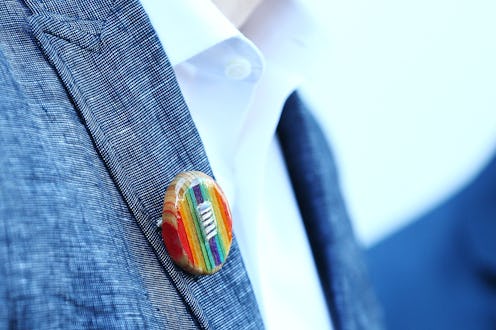
As the public becomes increasingly aware of gender identities that don't strictly fit under "man" or "woman," we're running into an issue: Most languages were created with the gender binary in mind. To solve this problem, gender-neutral terms are popping up that can be used to refer to non-binary people or to talk about people without specifying their gender. These also let us talk about others in a less gendered way if, for example, we want to address a group in a way that makes everyone feel included or talk about someone's partner if their gender hasn't been disclosed.
“The use of gender-neutral language has been widely recognized as being hugely important in the struggle for gender equality," Sam Dowd, British Didactics Expert from language learning app Babbel, tells Bustle. "Language is power, and when we speak about ‘mankind’ or ‘the achievements of man’, what we’re doing is confirming the subconscious bias that men are intellectually, morally, and physically superior to women — which is clearly untrue! By using such language, we exclude women (and, for that matter, people of non-binary gender) from history. As such, the term ‘herstory’ is now sometimes used in discourse to refer to the long-obscured achievements and struggles of women."
We could all stand to be more inclusive, so toward that end, here are some gender-neutral terms we should all be using.
1They
We've all used the word "they" to describe multiple people in the third person, but it's actually been used to describe a single person since the 14th century, says Dowd. "You’ll find ‘they’, ‘them’, ‘their’, ‘theirs’, and ‘themselves’ liberally littered throughout the works of great authors including Geoffrey Chaucer, Jane Austen, and Lord Byron." Now, the word has even made it into the style guides of publications like The Washington Post, both to describe people who go by this pronoun and to describe people without talking about their gender.
2Mx.
Mx. is an honorific, like Ms., Mrs, or Mr. While one of second-wave feminism's accomplishments was to popularize Ms. so women didn't have to specify if they were married or not, one of third-wave feminism's has been to popularize Mx. In 2015, it was even added to Dictionary.com. Some non-binary people use this honorific, but others can too if they simply prefer not to specify their gender.
3Humankind
"Mankind" is an inherently sexist term. It reinforces the general viewpoint that the normal, default type of human is male, and females and non-binary people are abnormal or exceptional. When we talk about people, we need to be mindful about ensuring we're really talking about everyone. Saying "humankind" or just "people" instead of "mankind" is one way to do this.
4Partner or Significant Other
The words "boyfriend" and "girlfriend" make it difficult for people to talk about their partners if they don't identify as men or women. In addition, they force LGBTQ people who may not feel comfortable coming out to disclose the gender of their partners. They also require people to make assumptions about others' partners if they don't yet know their gender. Saying "partner" or "significant other" helps us avoid these problems.
5First-Year Student
"Freshman" contains the word "man," a vestige of the days when universities only admitted male students. Yale recently established a standard to stop using this term, along with the term "upperclassmen," and instead say "first-year" and "upper-level." These terms can help non-male students feel like they belong at their school.
6Artificial
This word may not look like it belongs on a gender-neutral terms list, but as Dowd points out, it can be used as an alternative to "man-made" — because not everything "man-made" was made by men!" You can also say "machine-made" or "synthetic" instead of "man-made."
7Parent, Sibling, And Child
It's customary to use phrases like "my sister," "my son," and "my mom" even when specifying the person's gender isn't really necessary. "Parent," "sibling," and "child" help us talk about our family members without specifying their gender, especially if they don't identify strictly as men or women.
"Some people may argue that such concerns are unimportant, but if you consider that language is the primary filter through which we perceive the world, it’s obvious that it affects how we relate to and make judgements about one another," says Dowd. "Until now, history has been written and told by men, to the detriment of others. Part of any attempt to create a society in which all people — regardless of gender, sexuality or race — have equal opportunities and freedoms is to use language that no longer excludes certain groups or creates unconscious bias."